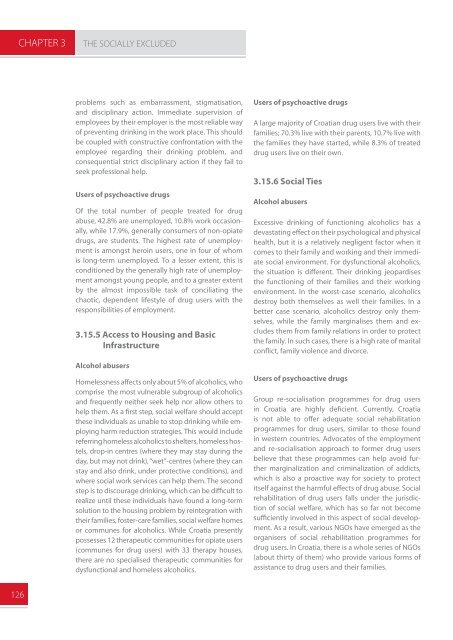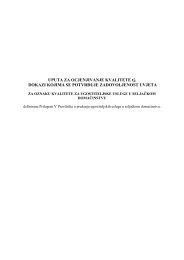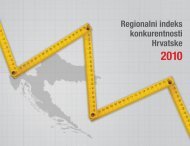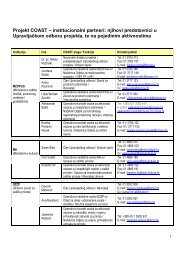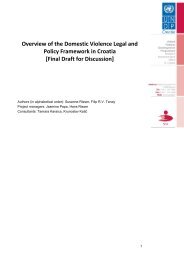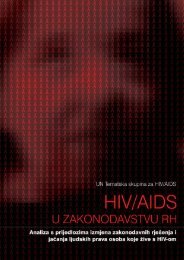WEB engleska verzija end.indd - UNDP Croatia
WEB engleska verzija end.indd - UNDP Croatia
WEB engleska verzija end.indd - UNDP Croatia
- No tags were found...
Create successful ePaper yourself
Turn your PDF publications into a flip-book with our unique Google optimized e-Paper software.
CHAPTER 3THE SOCIALLY EXCLUDEDproblems such as embarrassment, stigmatisation,and disciplinary action. Immediate supervision ofemployees by their employer is the most reliable wayof preventing drinking in the work place. This shouldbe coupled with constructive confrontation with theemployee regarding their drinking problem, andconsequential strict disciplinary action if they fail toseek professional help.Users of psychoactive drugsOf the total number of people treated for drugabuse, 42.8% are unemployed, 10.8% work occasionally,while 17.9%, generally consumers of non-opiatedrugs, are students. The highest rate of unemploymentis amongst heroin users, one in four of whomis long-term unemployed. To a lesser extent, this isconditioned by the generally high rate of unemploymentamongst young people, and to a greater extentby the almost impossible task of conciliating thechaotic, dep<strong>end</strong>ent lifestyle of drug users with theresponsibilities of employment.3.15.5 Access to Housing and BasicInfrastructureAlcohol abusersHomelessness affects only about 5% of alcoholics, whocomprise the most vulnerable subgroup of alcoholicsand frequently neither seek help nor allow others tohelp them. As a first step, social welfare should acceptthese individuals as unable to stop drinking while employingharm reduction strategies. This would includereferring homeless alcoholics to shelters, homeless hostels,drop-in centres (where they may stay during theday, but may not drink), “wet”-centres (where they canstay and also drink, under protective conditions), andwhere social work services can help them. The secondstep is to discourage drinking, which can be difficult torealize until these individuals have found a long-termsolution to the housing problem by reintegration withtheir families, foster-care families, social welfare homesor communes for alcoholics. While <strong>Croatia</strong> presentlypossesses 12 therapeutic communities for opiate users(communes for drug users) with 33 therapy houses,there are no specialised therapeutic communities fordysfunctional and homeless alcoholics.Users of psychoactive drugsA large majority of <strong>Croatia</strong>n drug users live with theirfamilies; 70.3% live with their parents, 10.7% live withthe families they have started, while 8.3% of treateddrug users live on their own.3.15.6 Social TiesAlcohol abusersExcessive drinking of functioning alcoholics has adevastating effect on their psychological and physicalhealth, but it is a relatively negligent factor when itcomes to their family and working and their immediatesocial environment. For dysfunctional alcoholics,the situation is different. Their drinking jeopardisesthe functioning of their families and their workingenvironment. In the worst-case scenario, alcoholicsdestroy both themselves as well their families. In abetter case scenario, alcoholics destroy only themselves,while the family marginalises them and excludesthem from family relations in order to protectthe family. In such cases, there is a high rate of maritalconflict, family violence and divorce.Users of psychoactive drugsGroup re-socialisation programmes for drug usersin <strong>Croatia</strong> are highly deficient. Currently, <strong>Croatia</strong>is not able to offer adequate social rehabilitationprogrammes for drug users, similar to those foundin western countries. Advocates of the employmentand re-socialisation approach to former drug usersbelieve that these programmes can help avoid furthermarginalization and criminalization of addicts,which is also a proactive way for society to protectitself against the harmful effects of drug abuse. Socialrehabilitation of drug users falls under the jurisdictionof social welfare, which has so far not becomesufficiently involved in this aspect of social development.As a result, various NGOs have emerged as theorganisers of social rehabilitation programmes fordrug users. In <strong>Croatia</strong>, there is a whole series of NGOs(about thirty of them) who provide various forms ofassistance to drug users and their families.126


